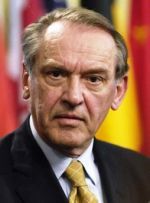Darfur peace talks could start soon – UN envoy
May18, 2007 (UNITED NATIONS) — Formal political negotiations to resolve the deadly conflict engulfing Sudan’s Darfur region could begin soon, with many of the warring parties indicating they are ready to sit down and talk, the senior United Nations envoy to the crisis said today.

“We have the beginning now of a credible political process,” he said during a press briefing following his most recent trip to the region with his African Union (AU) counterpart, Salim Ahmed Salim. “We are now at the stage where we will practically prepare for the negotiations.”
One of the biggest obstacles is the number of rebel movements in Darfur, which have grown because the movements have splintered into factions since the beginning of the fighting in the remote and impoverished region. At least nine distinct groups are now fighting the Government.
Eliasson said the number of rebel groups would present a major logistical challenge to organizing formal negotiations, but he was still confident that the process was on track as many of the groups have pledged that they are ready to talk.
“We expect all parties to cooperate; if they don’t, we will face a new stage, new era of conflict in Darfur,” he said.
More than 200,000 people have been killed across Darfur and at least 2 million others have been displaced since rebel groups took up arms in 2003 against Government forces, which have since been backed by the notorious Janjaweed militias.
The killings, destruction of villages, widespread displacement and human rights abuses have continued, despite the efforts of the under-resourced AU peacekeeping mission known as AMIS.
Under a deal struck by the UN, the AU and the Sudanese Government late last year, AMIS will be replaced in a three-step process by an eventual hybrid AU-UN peacekeeping force comprising about 17,000 troops and 3,000 police officers.
But Eliasson warned today that any peacekeeping operations would be in jeopardy so long as the political divisions driving the conflict are not resolved. “It’s time for us now to put much more emphasis on the political process,” he said. “If we don’t deal with the solutions, we will have major problems with peacekeeping in the years to come.”
He added that the swelling populations inside Darfur’s many camps for internally displaced persons (IDPs) – and those over the border in neighbouring Chad – were being steadily radicalized by the conflict, further endangering the sustainability of any solution.
The envoy also noted that more people in Darfur are being killed today in tribal clashes, often over productive land made scarce by desertification, than in fighting between the rebels and the Government and allied militias.
This aspect, combined with the splintering of the rebel groups, has made the conflict increasingly internecine and ever more complex to solve. It has also sundered community relations across the region.
“The cultural, social and economic fabric of Darfur is gone,” he said.
(UN News)
